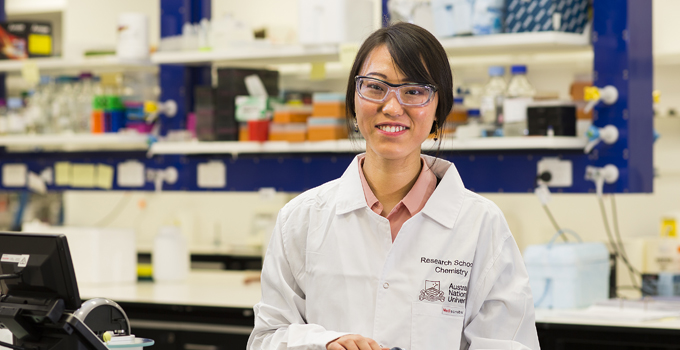Student Profile: Junna Hayashi – Tackling neurodegenerative diseases from different angles

Neurodegenerative diseases such as Parkinson’s and Alzheimer’s are one of the biggest concerns for our ageing population, especially with no cure or therapies to stop their progression. That is something that PhD student and Rickard’s Scholarship holder Junna Hayashi is trying to change, taking an interest in protein chemistry to try and understand these devastating illnesses.
“My research focuses on proteins involved in neurodegenerative diseases such as Parkinson's disease and Alzheimer's disease,” Hayashi explains. “In these diseases, proteins that we have in our healthy body change shape and form large clumps. The three main problems with this is that one, the healthy protein can’t function as normal anymore, two, the clump’s sheer mass becomes toxic to the cells and three, during the process of our healthy protein forming these large clumps, unwanted ‘side effects’ or more dangerous protein types are formed. We’re trying to figure out why this is happening as well as study the helper proteins which naturally prevent this undesirable process.”
Hayashi completed her undergraduate degree at Griffith University on the Gold Coast where she received a first-class honours and University medal. She came to the ANU to complete a summer scholarship, which she quickly transferred into a PhD, becoming the recipient of the Rod Rickard’s scholarship a year into her studies. Hayashi’s work on these proteins is focused based in three separate, but connected, projects.
Synucleins proteins have been strongly linked with Parkinson’s disease. “Synuclein can form large clumps and kill cells. Inside cells, all proteins live in a community, where they require the help of other proteins to carry out their functions. We then ask: when the Synucleins are toxic, are there any ‘bad guys’ or ‘bad proteins’ influencing the Synuclein to acquire this form? What about in comparison to when the Synuclein is happy and healthy; which proteins are the ‘good mentors’ or ‘good friends’ preventing them from turning ‘bad?’ Ultimately, we want to get a different profile of proteins surrounding the Synucleins when healthy versus toxic.”
“We then mimic a ‘healthy’ and ‘diseased’ cell state. While the cell is still alive, we put a tag on proteins surrounding our Synuclein protein. After opening the cells up to pull out those tags with the proteins attached, we can identify what those proteins actually are.
“In the second project, we work on proteins called molecular chaperone. They are ‘helper’ proteins which prevent proteins from forming large clumps in the cell.”
“One potential reason that unwanted clumps form is due to the helper proteins not working properly. Interestingly, we know that chaperone proteins prevent this unwanted process, but we’re not exactly sure how they do it! In our research, we may have found a possible mechanism as to why or how they act as a chaperone, which could then help us in understanding why they’re not doing their job.
“My final project examines the effects of dopamine on the same chaperone protein, because Parkinson’s disease selectively effects the brain cells that produce dopamine.”
“We’ve found that dopamine forces the chaperone to clump up as well, but surprisingly, it can still prevent other proteins from forming large clumps, so it still retains its function as a chaperone. ”
For Hayashi, having the Rod Rickard’s Scholarship has been extremely useful in being able to delve into such in depth projects.
“It’s been really good to not have to stress about money and look for jobs during my PhD,” Hayashi says. “It’s a big relief, and hence I’ve really been able to focus entirely on my research. It will be of great help when looking for future opportunities after I complete my PhD, as well as use the money to relocate to pursue research in overseas institutes.”
In doing so, Hayashi has developed a real passion for research, one which she wants to continue when she has finished her studies.
“It’s probably one of the most exciting times to be in research now, let alone be a graduate student. There are so many avenues to explore in this field. I want to go more to translational medicine, so something that has direct impacts on the therapeutic pipeline,” Hayashi explains.
“The work I’m currently doing is important, but it is very at the bottom of the pipeline. It's not going to get translated into medicines or therapeutics, at least not until very later down the track. So in the future I’d like to do something closer to the pipeline, as it would be nice to have a very direct impact these sorts of diseases.”
